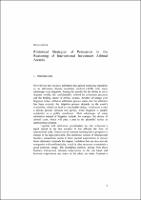Por favor, use este identificador para citar o enlazar este ítem:
https://repositorio.usj.es/handle/123456789/1084
| Título : | Rhetorical Strategies of Persuasion in the Reasoning of International Investment Arbitral Awards (Versión aceptada) |
| Autor: | Giner, Diana


|
| Palabras clave : | Arbitral awards; Arbitration; Interpersonality; Legal argumentation; Legal English; Hedging; Intensification; Attitude |
| Fecha de publicación: | 15-jul-2017 |
| Editorial : | Peter Lang |
| Citación : | Diana Giner Alonso. Rhetorical Strategies of Persuasion in the Reasoning of International Investment Arbitral Awards. Power, Persuasion and Manipulation in Specialised Genres: Providing Keys to the Rhetoric of Professional Communities - Linguistic Insights. 227, pp. 242 - 265. Peter Lang, 15/07/2017 |
| Resumen : | The language of arbitral awards must fulfil two purposes that seem, a priori, contradictory. On the one hand, awards are performative documents that require language to be precise and clear so as to avoid ambiguous interpretations of the law. However, on the other, the non-binding nature of arbitral awards and the fact that arbitrators are selected by the parties make persuading the audience a primary objective of this legal genre. This dichotomy is solved with rhetorical strategies of persuasion, which will accompany the readership to towards the final decision. Different choices of interpersonal language will aid the audience to concur with the reasoning presented in the award and leave behind alternative interpretations of the case facts. The present enquiry will focus on the analysis of hedging, intensification and attitude as rhetorical strategies of persuasion in the reasoning of international investment arbitral awards, taking into account the dialogic nature of the discourse of arbitration. Text-internal aspects do not appear in isolation but as a response to conventionalised expectations that achieve disciplinary goals (Bhatia, 1993, 2004). For this reason, the present enquiry will be carried out considering the varied socio-rhetorical situations of each case examined in a qualitative study. Special attention will be paid to the dynamism, gradability or multifunctionality (Breeze, Gotti and Sancho-Guinda, 2014) of these interactional concepts making it possible to find blended categories such as “intensified attitude”, different degrees of intensification or different hedging functions according to the situational context where they appear. The approach will essentially comprise principles of genre-analysis (Swales, 1990; 2004; Bhatia, 1993, 2004), interpersonality (Vande Kopple, 1985; Mauranen, 1997; Dafouz, 2003; Martin, 2004; Hyland, 2005; Martin and White, 2005) and also principles of argumentation or rhetoric (Perelman, 1979; Ducrot, 1982, 1986; Alexy, 1989; Halmari and Virtanen, 2005; Mazzi, 2007). . |
| URI : | https://repositorio.usj.es/handle/123456789/1084 |
| ISBN : | 9783034330107 |
| Aparece en las colecciones: | Capítulos de libros |
Ficheros en este ítem:
| Fichero | Descripción | Tamaño | Formato | |
|---|---|---|---|---|
| Rhetorical Strategies of Persuasion version aceptada.pdf | 309,46 kB | Adobe PDF |  Visualizar/Abrir |
Este ítem está sujeto a una licencia Creative Commons Licencia Creative Commons

